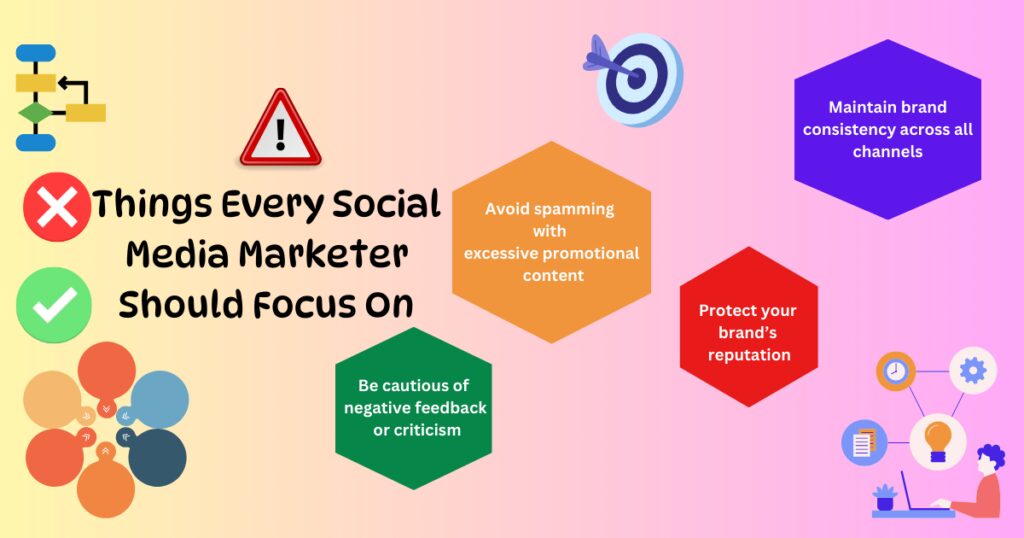Social media has become an indispensable tool for businesses looking to engage with their target audience and increase brand visibility. However, without a well-defined social media strategy, efforts on these platforms can be futile and ineffective. This comprehensive guide for social media marketer will walk you through the steps of creating an effective social media strategy and planning tailored to your business goals, along with providing real-life marketing strategy examples, tips, and warnings to help you maximize the impact of your social media efforts. It will give you a brief understanding of how digital marketing and strategy work together.
You can draw inspiration from some of the greatest marketing strategy examples such as Apple’s “Think Different” campaign, Nike’s “For Once, Don’t Do It” campaign for Black Lives Matter, or the London Olympics’ “Find Your Greatness” campaign. Marketing doesn’t only meant for showcasing product, features and price with discount. It must create an impact on customers mind and force him to purchase for being a part of something of the society.
Here’s some inevitable strategy compiled for Social Media Marketer:
1. Set Clear and Measurable Goals For Your Social Media Strategy
The foundation of any successful social media strategy lies in setting clear and measurable goals. These goals should be specific, measurable, achievable, relevant, and time-bound (SMART). For instance, your goal might be to increase website traffic by 20% within the next three months through social media channels. Alternatively, you could aim to boost online sales by 25% within the next year through your social media marketing efforts.
Setting clear goals not only provides direction for your social media strategy but also allows you to align your efforts with your overall business objectives. This ensures that your social media activities contribute directly to your desired outcomes, whether that’s increasing brand awareness, driving website traffic, or generating more leads and sales.
2. Understand Your Target Audience
Targeting the right audience is crucial in social media marketing for numerous reasons. Understanding the demographics, interests, and preferences of your audience allows you to tailor your content and messaging effectively. By conducting thorough market research and utilizing tools like social media analytics, you can gather valuable insights into your audience’s online behavior and the platforms they frequent. This enables you to craft a targeted social media strategy that resonates with your audience, increasing the likelihood of successful engagement and conversions.

A great example can be real estate social media marketing: In real estate social media marketing it serves as a potent tool for reaching potential clients, fostering brand awareness, and driving property sales. Platforms such as Facebook, Instagram, LinkedIn, and Twitter provide avenues for real estate professionals to engage directly with their target audience. By showcasing properties, sharing valuable insights, and positioning themselves as industry experts, real estate professionals can build trust and credibility with their audience. By effectively targeting the right audience, real estate professionals can maximize the impact of their social media marketing efforts, ultimately leading to increased client acquisition and business growth.
3. Choose the Right Social Media Platforms
Not all social media platforms are created equal, and it’s essential to identify the platforms that will yield the best results for your business. Analyze your target audience’s demographics and behavior to determine which platforms they are most active on. For example, if your target audience consists predominantly of professionals, platforms like LinkedIn might be more suitable than Instagram or TikTok.

Additionally, consider the characteristics of each platform and how they align with your business goals and content strategy. For instance, if your goal is to showcase visually appealing products or services, platforms like Instagram and Pinterest might be more effective than Twitter. There are social media marketing agency for small business, enterprise or b2b social media marketing agency which you should seek for great service.
Real-life Scenario: Fitness Apparel Brand
Let’s consider a fitness apparel brand targeting millennials and Gen Z interested in an active and healthy lifestyle. Their social media strategy goal is to increase brand awareness, drive website traffic, and ultimately boost sales.
Based on market research and audience behavior, the brand decides to focus primarily on Instagram, TikTok, and YouTube. Their content strategy includes high-quality product photos, workout videos, fitness challenges, behind-the-scenes brand content, influencer collaborations, and user-generated content featuring their apparel. These are perfect social media marketing examples we should look at.
4. Develop Engaging and Relevant Content
Creating high-quality and engaging content is crucial for a successful social media strategy. This content can take various forms, such as blog posts, videos, infographics, and polls. Tailor your content to match the preferences of your target audience and the characteristics of the social media platform you are using.
Experiment with different types of content formats and monitor engagement metrics to identify what resonates best with your audience. For example, if your target audience is highly visual, prioritize visually appealing content like images, videos, and infographics. If they prefer educational content, focus on creating informative blog posts, tutorials, or webinars. In social media marketing world content means everything so you should create quality content that people engages with.
Additionally, ensure that your content aligns with your overall brand voice and messaging, fostering brand recognition and trust among your audience.
5. Implement a Consistent Content Calendar
Maintaining a consistent and organized presence on social media is essential for building and retaining an engaged audience. A content calendar helps you plan and schedule your social media posts in advance, ensuring that you have a steady flow of content that aligns with your goals and resonates with your audience.

Use a content management tool or even a simple spreadsheet to plan your content calendar, including specific dates, times, platforms, and post types. This will not only help you maintain consistency but also ensure that you are providing a diverse range of content to keep your audience engaged.
6. Engage with Your Audience
Social media is not just about broadcasting your message; it’s also about actively engaging with your audience. Responding promptly to comments, messages, and mentions is crucial in building a connection with your audience and creating a positive perception of your brand.

Actively participate in relevant conversations, ask questions, and encourage user-generated content to foster engagement. This two-way communication not only strengthens your relationship with your audience but also provides valuable insights into their preferences and pain points, which can inform your future content and marketing strategies.
7. Monitor, Analyze, and Optimize Performance
Regularly monitoring and analyzing the performance of your social media efforts is essential to evaluate the effectiveness of your strategy. Track key metrics such as reach, engagement, conversions, and website traffic. Utilize tools like Google Analytics, social media analytics platforms, and built-in platform insights to measure the success of your efforts and identify areas for improvement. 
Based on your analysis, optimize your strategy by adjusting your content, platforms, or engagement tactics. This iterative process of monitoring, analyzing, and optimizing will ensure that your social media strategy remains relevant and effective, driving sustainable growth and achieving your business objectives.
Tips for a Successful Social Media Strategy
- Stay up-to-date with trends and algorithm changes: Social media platforms are constantly evolving, and it’s essential to stay informed about the latest trends and algorithm changes. This will help you optimize your strategy and ensure that your content remains visible and engaging to your target audience and also create a better digital marketing strategy. Also, you should keep updating your marketing with social trends like Black Lives Matter and Women’s Rights. One of the greatest trend-driven marketing strategy examples can be Nike’s campaign on Black Lives Matter.
- Experiment with different content formats: To keep your audience engaged and interested, experiment with various content formats, such as videos, live streams, polls, and interactive stories. Simply test your content strategy. This variety will not only prevent content fatigue but also allow you to identify the most effective formats for your audience. Also, create sample marketing strategies you can use most of the time.
- Collaborate with influencers or industry experts: Partnering with influencers or industry experts can help expand your reach and credibility. Their established audience and expertise can lend authenticity to your brand, fostering trust and engagement with your target audience.
- Utilize social media advertising: While organic reach is valuable, leveraging social media advertising can amplify your reach and target specific audience segments with precision. This can be particularly effective for promoting special offers, new product launches, or driving traffic to your website.
- Regularly review and update your strategy: Social media is a dynamic landscape, and your marketing strategy should evolve to adapt to changing market dynamics and audience preferences. Regularly review and update your social media strategy to ensure its ongoing effectiveness and alignment with your business goals, or create social media strategy examples (aka A/B testing) to get a better strategy creation process.
Things Every Social Media Marketer Should Focus On

- Avoid spamming with excessive promotional content: While promoting your products or services is essential, it’s crucial to strike a balance between promotional content and value-added content that educates, entertains, or inspires your audience. Excessive self-promotion can lead to disengagement and a negative perception of your brand.
- Be cautious of negative feedback or criticism: Social media can be a double-edged sword, and negative feedback or criticism can quickly escalate if not handled properly. Be prepared to respond professionally and promptly to address any issues or concerns raised by your audience.
- Maintain brand consistency across all channels: Consistency is key to building a strong and recognizable brand image. Ensure that your brand voice, messaging, and visual identity remain consistent across all social media channels to create a cohesive and trustworthy brand experience.
- Protect your brand’s reputation: Social media can be a hotbed for controversial or sensitive topics. Exercise caution and avoid engaging in discussions or sharing content that may alienate or offend your audience, potentially damaging your brand’s reputation.
Creating an effective social media strategy requires social media marketers’ careful audience understanding, engaging content production, and continuous analysis and optimization. By setting clear goals, choosing the right platforms, and implementing a consistent content calendar, you can build a successful social media presence for your business. Social Media is playing a greater role in marketing as well as social media influencer is also crucial for business and branding. So, you have to focus on social media marketing with priority to build a brand.
There are also automated AI based social media marketing tools like Namecheap. This will ultimately drive growth, foster customer loyalty, and achieve your desired objectives in the digital marketing strategy of 2024 and beyond. Also get social media marketing consultancy before running a campaign blindly and throw money away.


2 thoughts on “7 Effective Strategy Every Social Media Marketer Should Know”
Excellent blog here Also your website loads up very fast What web host are you using Can I get your affiliate link to your host I wish my web site loaded up as quickly as yours lol